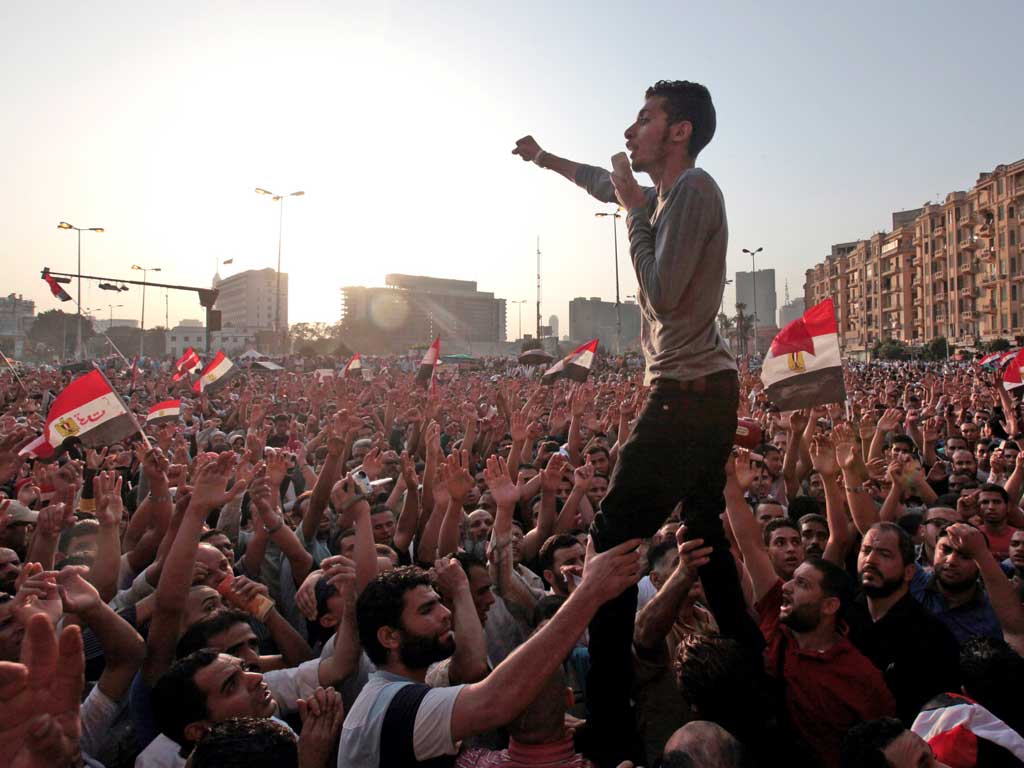Anger on the streets threatens to derail Egypt poll
Egyptian presidential hopeful feels anger of a nation after court clears Mubarak's sons

Egypt's streets were at fever pitch last night as a series of huge protests threatened to disrupt this month's presidential run-off vote.
After many weeks in which the appetite for street politics appeared to have been snuffed out, tens of thousands of people flocked to town and city centres to voice their fury at the ruling Egyptian establishment.
The protests were triggered by Saturday's verdict in the trial of Hosni Mubarak, in which Egypt's former leader was jailed for life but six police chiefs also accused of killing civilians were acquitted.
Following those verdicts, protesters have aimed their fury at Ahmed Shafik, the former air force chief and Mubarak's final Prime Minister, who shocked millions of Egyptians by finishing as runner up in last month's first-round poll.
Mr Shafik, a self-styled strongman who reportedly threatened to use executions to restore order if elected President, is considered by many activists to be a dangerous remnant of the regime which many believed had been fatally wounded by last year's uprising.
At a press conference yesterday, Mr Shafik cast himself as a defender of secular values against the political Islam advanced by the Muslim Brotherhood. "I represent a civil state, the Brotherhood represents a sectarian Brotherhood state," he said.
"I represent moving forward, they represent going backwards."
Mr Shafik's opponent in the 16-17 June run-off is the Muslim Brotherhood's Mohamed Morsi. But many activists believe that Mr Shafik should not be allowed to take part in the presidential election. The calls for his disqualification stem from a law recently passed by parliament – and currently being reviewed by judges – which states that any official who served alongside Mubarak over the past 10 years should not be eligible to run.
In a sign of the potential problems ahead, one of his campaign offices was ransacked over the weekend in Fayoum, south of Cairo – the second such attack in recent days. With activists calling for further rallies, it appears yet more pressure will be heaped on the Egyptian authorities in the run up to the presidential run-off.
Mubarak, the man who ruled Egypt for three decades, was given a life sentence after being found guilty of complicity in the killing of hundreds of civilians during the uprising which toppled him last year.
But the anger emerged after six senior police officials who were being tried alongside Mubarak were found innocent, sparking outrage from activists and victims' families. There was further disbelief when Mubarak's sons, being tried alongside their father, were found not guilty on corruption charges.
Following the verdicts, which were broadcast live on Egyptian television, a small group of protesters hurled rocks and stones at the ranks of the central security forces outside the court – a hated symbol of Mubarak-era rule. Yesterday, Egypt's general prosecutor appealed against the acquittals.
In a show of the resentment, tens of thousands of protesters began demonstrating against the verdict.
In the northern city of Alexandria, the Mediterranean waterfront was crammed with chanting protesters, while in Cairo's Tahrir Square – crucible of the uprising which toppled Mubarak – demonstrations continued into the early hours of yesterday morning.
Mohamed Morsi, along with some of his defeated presidential opponents, visited protesters in Tahrir Square on Saturday. It led to accusations from some liberals that the Brotherhood – regarded with deep suspicion by many activists – is trying to co-opt the tide of popular protest and convert it into electoral support for Mr Morsi.
Yesterday, Mr Morsi met his two main defeated opponents, the leftist Hamdeen Sabahy and the Islamist reformer Abdel Moneim Abol Fotouh, in a closed-door meeting.
Join our commenting forum
Join thought-provoking conversations, follow other Independent readers and see their replies
Comments
Bookmark popover
Removed from bookmarks